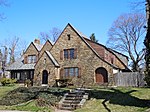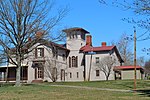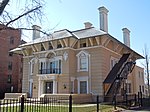Trinity Episcopal Cathedral (Trenton, New Jersey)
20th-century Episcopal church buildingsChristian organizations established in 1930Churches in Trenton, New JerseyEpiscopal cathedrals in New JerseyEpiscopal church buildings in New Jersey ... and 1 more
Gothic Revival church buildings in New Jersey

Trinity Episcopal Cathedral is an Episcopal cathedral located in Trenton, New Jersey, United States. It is the seat of the Diocese of New Jersey.
Excerpt from the Wikipedia article Trinity Episcopal Cathedral (Trenton, New Jersey) (License: CC BY-SA 3.0, Authors, Images).Trinity Episcopal Cathedral (Trenton, New Jersey)
Berkeley Avenue, Trenton
Geographical coordinates (GPS) Address Nearby Places Show on map
Geographical coordinates (GPS)
| Latitude | Longitude |
|---|---|
| N 40.229397222222 ° | E -74.787002777778 ° |
Address
Trinity Cathedral Academy School
Berkeley Avenue
08618 Trenton
New Jersey, United States
Open on Google Maps









